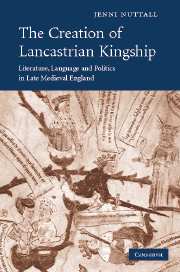Book contents
- Frontmatter
- Contents
- Acknowledgements
- Note on quotations and references
- Note on editions
- Abbreviations
- Introduction
- PART I HOUSEHOLD NARRATIVES
- PART II CREDIT AND LOVE
- 6 Promises, expectations, explanations and solutions
- 7 A discourse of credit and loyalty
- 8 Credit and fraud in Hoccleve's Regiment
- Conclusion: Lancastrian conversations
- Notes
- Bibliography
- Index
- CAMBRIDGE STUDIES IN MEDIEVAL LITERATURE
6 - Promises, expectations, explanations and solutions
Published online by Cambridge University Press: 27 October 2009
- Frontmatter
- Contents
- Acknowledgements
- Note on quotations and references
- Note on editions
- Abbreviations
- Introduction
- PART I HOUSEHOLD NARRATIVES
- PART II CREDIT AND LOVE
- 6 Promises, expectations, explanations and solutions
- 7 A discourse of credit and loyalty
- 8 Credit and fraud in Hoccleve's Regiment
- Conclusion: Lancastrian conversations
- Notes
- Bibliography
- Index
- CAMBRIDGE STUDIES IN MEDIEVAL LITERATURE
Summary
Like ripples from a stone thrown in a lake, the paradigms of youthful tyranny and household misgovernance put forward in the deposition schedule reverberated through political debate in the decades following the deposition. They politicized pre-existing discourses with which they came into contact and changed the priorities and forms of political speech and action. Moreover, they escaped from the control of their creators, rebounding in unexpected ways upon the Lancastrian Crown. Household narratives and youthful misdemeanours gave distinct forms to Lancastrian poetry, shaping the manner in which authors such as Hoccleve, Scogan and Gower addressed Lancastrian readers. Yet the rule of the self and the household were not the only areas in which discussion changed following the deposition. From the same beginning, a parallel process occurred in discussion of Crown finances and of the Crown's fiscal relationship with its subjects. The deposition set in motion a series of changes in financial debate in both political and literary contexts. Retrospective representations of Richard's financial policies, in combination with promises and expectations which emerged following Henry's accession, shaped both the explanations given for deficits and shortages in Crown finance and the solutions proposed by Henry, his Council and his Commons. This newly politicized language was used to discuss both practical problems in the financing of national government and also wider questions concerning the Crown's symbolic credit, that is the loyalty and affection felt towards it by its subjects.
- Type
- Chapter
- Information
- The Creation of Lancastrian KingshipLiterature, Language and Politics in Late Medieval England, pp. 75 - 93Publisher: Cambridge University PressPrint publication year: 2007



